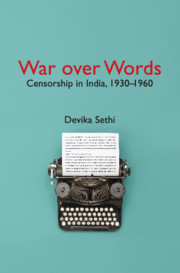Book contents
- Frontmatter
- Dedication
- Contents
- Acknowledgements
- List of Abbreviations
- Introduction
- Part I Guarding the State, Protecting the Public: Censorship Policies and Practices in the 1930s
- Part II Protests and Publicity: Banning Non-Indian Authors
- Part III Political or Military? Censorship in India during the Second World War
- Part IV The Censored Turn Censors: Freedom and Free Speech
- Conclusion
- Epilogue
- Bibliography
- Name Index
- General Index
Part IV - The Censored Turn Censors: Freedom and Free Speech
Published online by Cambridge University Press: 26 April 2019
- Frontmatter
- Dedication
- Contents
- Acknowledgements
- List of Abbreviations
- Introduction
- Part I Guarding the State, Protecting the Public: Censorship Policies and Practices in the 1930s
- Part II Protests and Publicity: Banning Non-Indian Authors
- Part III Political or Military? Censorship in India during the Second World War
- Part IV The Censored Turn Censors: Freedom and Free Speech
- Conclusion
- Epilogue
- Bibliography
- Name Index
- General Index
Summary
A historian of political censorship in 19th-century Europe has called censorship a ‘combination of Rorschach test and barometer’. As a Rorschach test, the censorship conducted by a state allows us to see the ‘type and degree of fears’ harboured by its political elite; as barometer, it gauges the political atmosphere. In other words, what is not allowed to appear in print or expressed in public tells us more about the nature of a state than what is allowed to be freely expressed. In the context of the 20th century as well, the degree of censorship exercised over the media by a state is often taken as an index of the freedom that state allows its citizens. For example, the presence and application of censorship laws in colonial India is often taken as confirmation of the authoritarian character of the colonial state. But what do the censorship practices of the early post-colonial Indian state tell us about that state? This is a question that existing academic literature has not addressed in a sustained manner, and one which is at the heart of this book.
In the years leading to Independence and during Partition, the Indian state's experience of trying—and failing—to control publication of communal and inflammatory news and views had important ramifications for the future of free speech in independent India. After the easing in of Indian leaders into positions of power in the year before Independence, their ideological commitment to the idea of free speech was severely tested when faced with communal violence. The manifesto of the Indian National Congress for the central and provincial elections of 1945–1946 listed—as the very first fundamental right—the right of ‘free expression of opinion’. As the Congress assumed state power in the midst of communal carnage, several qualifications and restrictions hemmed in this right, and several experiments (with their roots in the Second World War period) in organizing state–press relations were carried out, with varying degrees of success. The ‘long’ 1950s (from Independence in 1947 up to the Indo-China war in 1962) has been conceptualized by a recent chronicler, Gyanesh Kudaisya, as a period both ‘transformative’ and ‘definitive’ for India, and for our understanding of India's contemporary history. The three chapters in this part illustrate and discuss the experiments with free speech legislation and lived experience of this decade, and their legacy for India today.
- Type
- Chapter
- Information
- War over Words , pp. 173 - 174Publisher: Cambridge University PressPrint publication year: 2019



